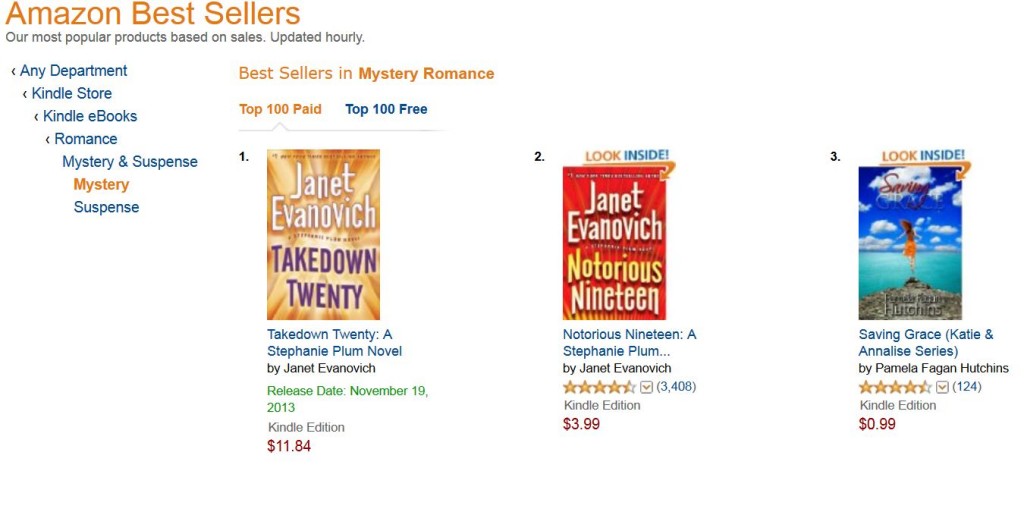 I LOVE Amazon. Please understand, as an indie author, I make the bulk of my $$$$$ on Amazon. In many ways, they single-handedly caused the leveling of the traditional publishing playing field so that indies have a chance to publish on their terms.
I LOVE Amazon. Please understand, as an indie author, I make the bulk of my $$$$$ on Amazon. In many ways, they single-handedly caused the leveling of the traditional publishing playing field so that indies have a chance to publish on their terms.
I don’t love EVERYTHING about Amazon, however, because I’m not a robot. I don’t love their e-book gifting policy, for example, as I’ve written about before. I also do not love the whole pre-order favoritism BS they still perpetuate.
Case in point: I cannot put my ebooks on Amazon for pre-order. Traditionally published authors can. Note: I can pre-sell my ebooks on Barnes and Noble, iTunes, Kobo, and Smashwords. Hmmm.
Add to this that my ebook sales only count when a customer pays for them (as with the gifting policy), and then take a gander at what happened to me this week:
I had an extremely successful 99 cent ebook sale this week of Saving Grace, the 1st book in my Katie & Annalise romantic mystery series. The bulk of my sales, of course, were on Amazon. This sale was important to me because I had re-categorized the series as romantic mysteries/cozy mysteries from women’s sleuth mysteries/women’s fiction, and that, amongst other missteps, had a temporarily catastrophic impact in my Amazon sales.
My peak ranking was #3 in romantic mysteries, and #692 overall. Since I got turned down by BookBub (six times, even though this book has a 124 review 4.5-star rating and three major awards! But they’ve accepted the next novel in the series for Nov. 19th!), I went with eReader News Today, Kindle Books and Tips, and Bargain Book Hunter instead. Well, them and my beloved Author Marketing Club, who partnered with World Literary Cafe on a Friday announcement that I think did wonders for my sales.
In spots #1 and #2 ahead of me was Janet Evanovich, the writer I am most-often compared to. Not unexpected. And had I not noticed one tiny little detail about her book in the #1 spot, I would have been completely satisfied with this showing.
The book in the #1 spot was an e-book for pre-order.
Not only that, but you and I both know that pre-orders are not paid sales. Credit cards aren’t charged until the book is sent. This is a critical point, as one of the primary benefits of pre-orders is that all pre-orders land as sales on the date of release/shipment of the ebooks, causing a huge spike in first day rankings for the lucky author.
But this is having your cake and eating it too, isn’t it? If Janet is going to get credit for all those pre-orders on November 19th when they ship, why is she getting credit for them now as paid sales when they haven’t been paid for yet?
This is a double whammy for an self-pubbed or small press author, both indie in my book, and a group which includes me. On Amazon, I can’t offer Kindle pre-orders, and only my paid sales count. Janet will thus always win. And she (and others) wins, one might surmise, b/c of the money changing hands and the deals made between the seller, Amazon, and the publisher(s). That’s just business. It’s also unfair.
If this unfairness hadn’t been part of the system on the day I hit #692 overall and #3 in romantic mystery, how many places higher in the rankings would my book have landed? If we tossed all the pre-order ebooks out, at a minimum I would have been #2 in my category. At a minimum.
Rankings mean sales, people. Any unfairness in the ranking system decreases the sales to those treated unfairly.
What about you? Have you been impacted by how Amazon handles pre-orders, paid sales, and rankings?
Now, all that being said, I am HAPPY I hit 692/3. I won’t be ditching the Amazon ship any time soon. But I won’t sail along with it with a gag in my mouth either.
Pamela
Pamela Fagan Hutchins is an employment attorney and work place investigator by day who writes award-winning and bestselling mysterious women’s fiction (Saving Grace) and humorous nonfiction (How to Screw Up Your Kids) by night. She is passionate about great writing and smart author-preneurship. She also leaps medium-tall buildings in a single bound, if she gets a good running start.
place investigator by day who writes award-winning and bestselling mysterious women’s fiction (Saving Grace) and humorous nonfiction (How to Screw Up Your Kids) by night. She is passionate about great writing and smart author-preneurship. She also leaps medium-tall buildings in a single bound, if she gets a good running start.
Did you like this post? We help indie publishers skip all the jack. Sign up for
It is frustrating that they have so much power and are able to do whatever they want to (fairness not important) and yet, they also are the ones that almost single-handedly have made Indie Publishing a reality.
Ugh